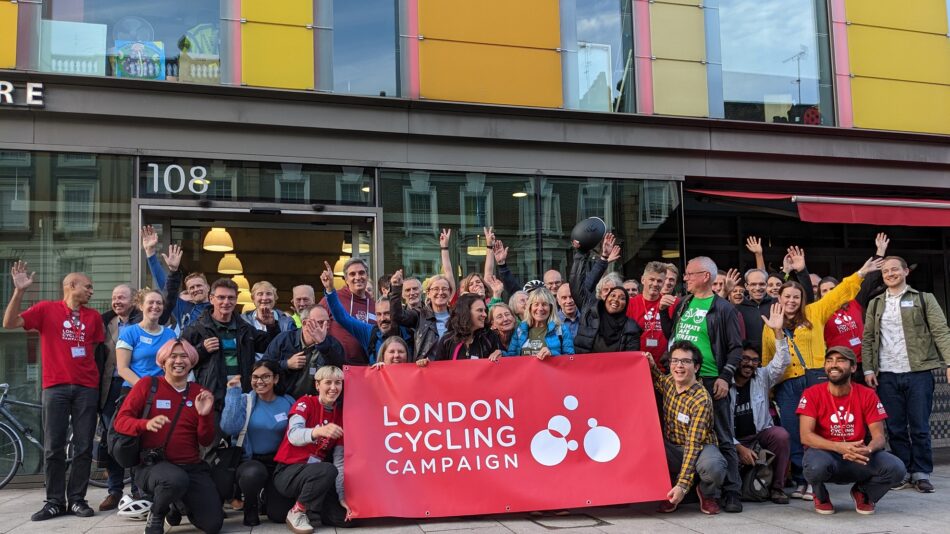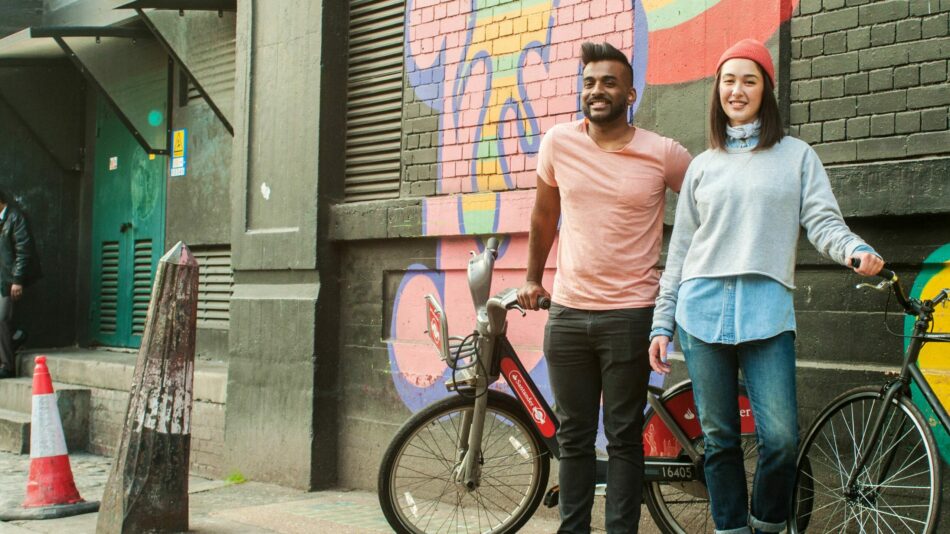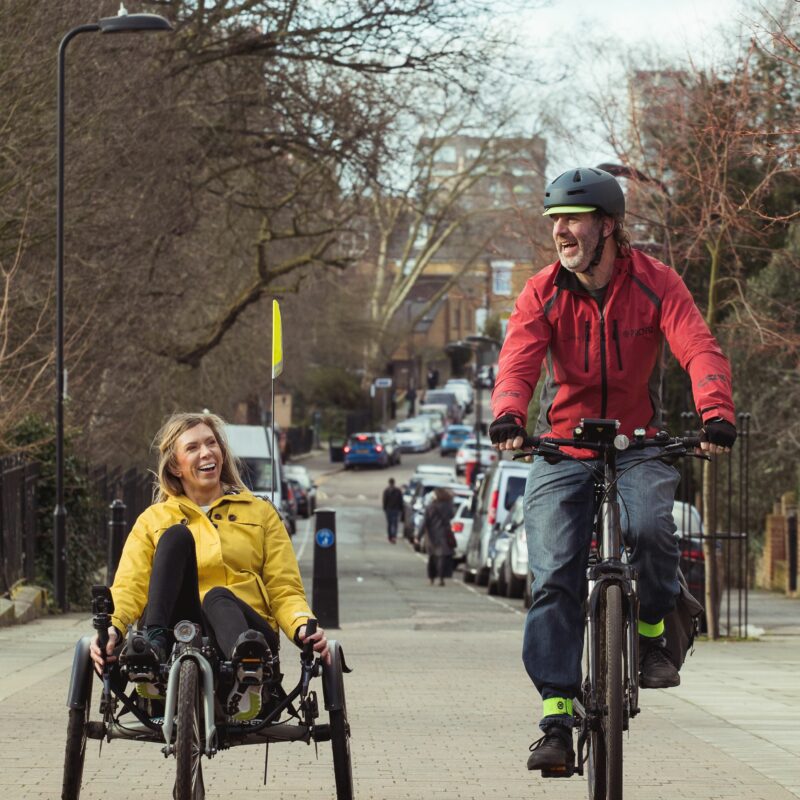
LCC Community Skills Summit, 18 Nov
A day of talks, workshops & networking on Saturday 18 Nov, to help skill up & inspire you to improve your area better for cycling, walking & wheeling

A day of talks, workshops & networking on Saturday 18 Nov, to help skill up & inspire you to improve your area better for cycling, walking & wheeling
Our event is open to all and has a fantastic range of workshops, drop-in sessions and an opening plenary. Come for:
Full event details including getting there

COMMUNITY SKILLS SUMMIT
Learn how you can maximise your campaigning and make London a better place for walking, wheeling & cycling - register now to confirm your place.
Note: Some sessions are repeated throughout the day
Registration & arrival for the Community Skills Summit with tea/coffee provided.
Haringey social media legend Carla Francome and Leo Murray of climate charity Possible will discuss one of the key themes of this summit: the increasing need to engage hearts as well as minds when campaigning on active travel. The argument, after all, on data and evidence, is largely won now. We know how to deliver on active travel, mode shift etc. and we know what good looks like in delivering – as do an increasing range of councillors and officers. But we don’t spend enough time on ‘why they should care’ and ‘what they care about’ in general. As London and the world changes, we need more campaigners who can paint a positive vision, draw people in, talk about feelings and hopes and fears, as well as kerb radii and planter positioning.
How to get started in campaigning
Do you want to make your neighbourhood nicer and safer for active travel but don’t know where to begin? Or have you just gotten involved with a campaign group, but want to learn the basics? This session will cover the basics you need to know when getting started in campaigning including an explanation of political will, LCC’s Pathway Approach and first steps you can take.
Using emotion & psychology to win change
The future of active travel campaigning isn’t kerb splays and signal phases. Building from the plenary session, this workshop will offer practical exercises to winning hearts and minds of those in your borough using emotion and telling stories. This will include coming up with emotional campaigning aims and how to tie those to more concrete asks, as well as ‘storytelling’ hooks and how to persuade politicians and the public using them.
Building a campaign for everyone
Everyone in London should feel able to cycle and the people who do cycle should be representative of London. But just as cycling in your area is likely OK for you, while your group may feel good for you, it may not be for everyone. This session is about making sure your group is genuinely representative of your area – and how that’ll help your campaigning and ensure your group gets more done, as well as how to talk to other communities, build coalitions, and campaign for accessible infrastructure.
Session full - Upping pace & quality: get more from your council
From the point when your council starts delivering schemes, there’s every chance the two things you’ll need to focus on are improving pace of delivery and quality. Officers will need to be brought round, you’ll need to be able to counter ‘computer says no’ mentalities and you’ll need to be able to win over councillors to do more, potentially with very little funding. But how do to do this best? ‘Critical friend’ campaigning can be the toughest balancing test campaigners face.
Free vegetarian lunch provided, alongside informal networking and breakout sessions with the Women’s Network, Cycle Buddies and more.
Getting help to grow your group
It can feel like it’s you against the world when your group is tiny. This session is to help you get more people involved with your group and show you how to reach out to other groups and communities in the borough and make links, as well as how to make meetings not just welcoming, but enticing. Because the more people you can attract to engage with you, the easier campaigning gets.
While intended for campaigners in councils on Stage 1 of our Pathway Approach, this session will be helpful for anyone that needs more volunteers to help with their campaigning.
How to get your council leadership shifting on active travel
The key to getting your council to act on active travel is to get your council leader (and portfolio holder) on board. This session will lead participants live through researching and building up a strategy on a council leader as well as when to look beyond the leader.
This session is particularly for campaigners in councils on Stage 2 of our Pathway Approach, though is also recommended for those on Stage 3 that could do some more work to really cement political support.
Dealing with council wobbles and setbacks
Two steps forward are great, but that one back can be brutal. Even councils that have delivered schemes face a risk of backsliding, especially when councils face opposition or have done too much too fast. This session will cover what leads to ‘wobbles’ and setbacks and how best to respond when your council gets them. We’ll cover building trust, informal communications, when to back off and when to push, triangulation and more.
This session is aimed at campaigners whose councils are on Stage 3 of our Pathway Approach, though Stage 4 groups may also find their council wobbling at times.
What's beyond the cycle network?
Our Pathway Approach is all about getting councils to have the political will to deliver a coherent network of cycle routes. But once you’ve got that, even before, alongside it, there’s clear and good reasons to embrace other activities. This session will cover both rolling out cycling beyond your core town centres and areas but also what else you can do once infrastructure is in and before to diversify and spread cycling – building coalitions, talking to new communities, cargo bike loans and more.
This session is mostly aimed at campaigners whose councils are on Stage 4 of our Pathway Approach, but others interested in ‘storytelling’ and ‘soft measures’, indeed most people, should find it useful.
Family cycling
Kids love cycling, and politicians hate looking mean to kids. Organising family rides, events and campaigning tactics is a great way to engage with people in your borough and win over politicians. Kids can show your council the suppressed demand for cycling, and really bring to the forefront issues with weak infrastructure. This session will cover safely organising family rides even in areas without much infrastructure, as well as bike buses, safeguarding issues and media consent, and how to integrate kids voices into your campaigning.
Using emotion & psychology to win change
The future of active travel campaigning isn’t kerb splays and signal phases. Building from the plenary session, this workshop will offer practical exercises to winning hearts and minds of those in your borough using emotion and telling stories. This will include coming up with emotional campaigning aims and how to tie those to more concrete asks, as well as ‘storytelling’ hooks and how to persuade politicians and the public using them.
Building a campaign for everyone
Everyone in London should feel able to cycle and the people who do cycle should be representative of London. But just as cycling in your area is likely OK for you, while your group may feel good for you, it may not be for everyone. This session is about making sure your group is genuinely representative of your area – and how that’ll help your campaigning and ensure your group gets more done, as well as how to talk to other communities, build coalitions, and campaign for accessible infrastructure.
Session full - What works in outer London?
Outer London boroughs face unique challenges as they are typically car dominated with high levels of ownership and motor vehicle mode share, lower public transport density and active travel levels, and the issues these all bring. If we can’t crack outer London for active travel though, we’re all doomed. So what techniques are working and how should we apply them?
Getting help to grow your group
It can feel like it’s you against the world when your group is tiny. This session is to help you get more people involved with your group and show you how to reach out to other groups and communities in the borough and make links, as well as how to make meetings not just welcoming, but enticing. Because the more people you can attract to engage with you, the easier campaigning gets.
While intended for campaigners in councils on Stage 1 of our Pathway Approach, this session will be helpful for anyone that needs more volunteers to help with their campaigning.
How to get your council leadership shifting on active travel
The key to getting your council to act on active travel is to get your council leader (and portfolio holder) on board. This session will lead participants live through researching and building up a strategy on a council leader as well as when to look beyond the leader.
This session is particularly for campaigners in councils on Stage 2 of our Pathway Approach, though is also recommended for those on Stage 3 that could do some more work to really cement political support.
Communicating your campaign
How you communicate to your members and supporters, to residents in your borough, to key stakeholders and politicians can either grow support for your cause and get schemes in or see you struggling to be heard. A masterclass on both positive and negative comms.
Featuring:
What works in outer London?
Outer London boroughs face unique challenges as they are typically car dominated with high levels of ownership and motor vehicle mode share, lower public transport density and active travel levels, and the issues these all bring. If we can’t crack outer London for active travel though, we’re all doomed. So what techniques are working and how should we apply them?
We will leave the venue and head off to continue our knowledge- and enthusiasm-sharing informally possibly at the Galyons Bar and Kitchen – circa 5 minutes cycle along the dockside.



Last year’s event genuinely inspired me to change my approach to active travel. Thanks to the practical skills I learned in the workshops, the advice I was given and the contacts I made, the Community Skills Summit helped me understand how each of us can promote active travel and safer streets in our local communities. Most of all, spending a day with so many friendly, like-minded people gave me the confidence I needed to get involved closer to home in helping more people rediscover the joy and practicality of cycling.
Suzanne, Campaigner in Kingston

Address: West Building, University of East London Docklands campus, University Way, London E16 2RD. (Google Maps location here, entrance next to Costa Coffee)
Accessibility: The venue is fully wheelchair accessible. You can read more on accessibility for the building and campus here. If you have any other accessibility requirements, please do not hesitate to email us.
Families: Young children and babies are welcome. There will be an informal area for kids and families to hang out, but children will need to be supervised by a parent at all times while in attendance.
Dietary requirements: Event catering is vegetarian. If you have other dietary requirements (eg vegan, gluten-free), you can let us know via the booking form.
Cycling: The venue is about a 45 minute ride from the west end but you can take bikes on the Elizabeth Line (Custom House, 14 minute cycle, change to DLR available) and DLR (Cyprus, 1 minute). Suggested cycle routes include C3 to Lower Lea Crossing or Silvertown Way then ride alongside the dock, or Q22/Greenway from north/east London.
Public transport: As above, step-free access from Elizabeth Line at Custom House to Cyprus DLR
Cycle storage: Standard bicycle racks are available for public use directly outside the building and nearby on a quiet campus with security. We will also have limited indoor cycle storage space available within our conference rooms on the day for anyone with mobility needs or a high-end cycle.
Photography: There will be a photographer present at this event. If you do not wish to be photographed, please make yourself known to a member of staff on the day.
Cost: This is a free event but we would greatly appreciate any contributions to help cover the cost of putting on the Summit this year. For those in full time employment we suggest making a donation of £15. For those not in full time employment we suggest making a donation of £5. Even if you don’t make a donation, you are still very welcome to attend the event: it’s important no one is excluded. And if you’re not a member already, please do consider joining LCC. We’re a charity, and all funds go towards supporting our work.

BECOME A MEMBER AND SUPPORT OUR WORK
LCC is highly effective because it's supported by 12,000 members. If you cycle in London please consider joining today. You'll be supporting our work and you'll receive a free set of CatEye lights, along with a huge range of benefits.
KEEP UP TO DATE
